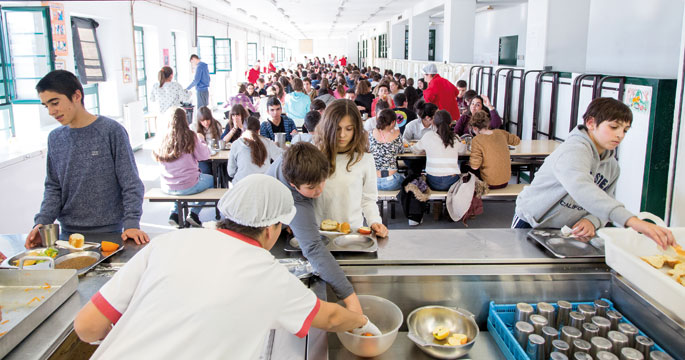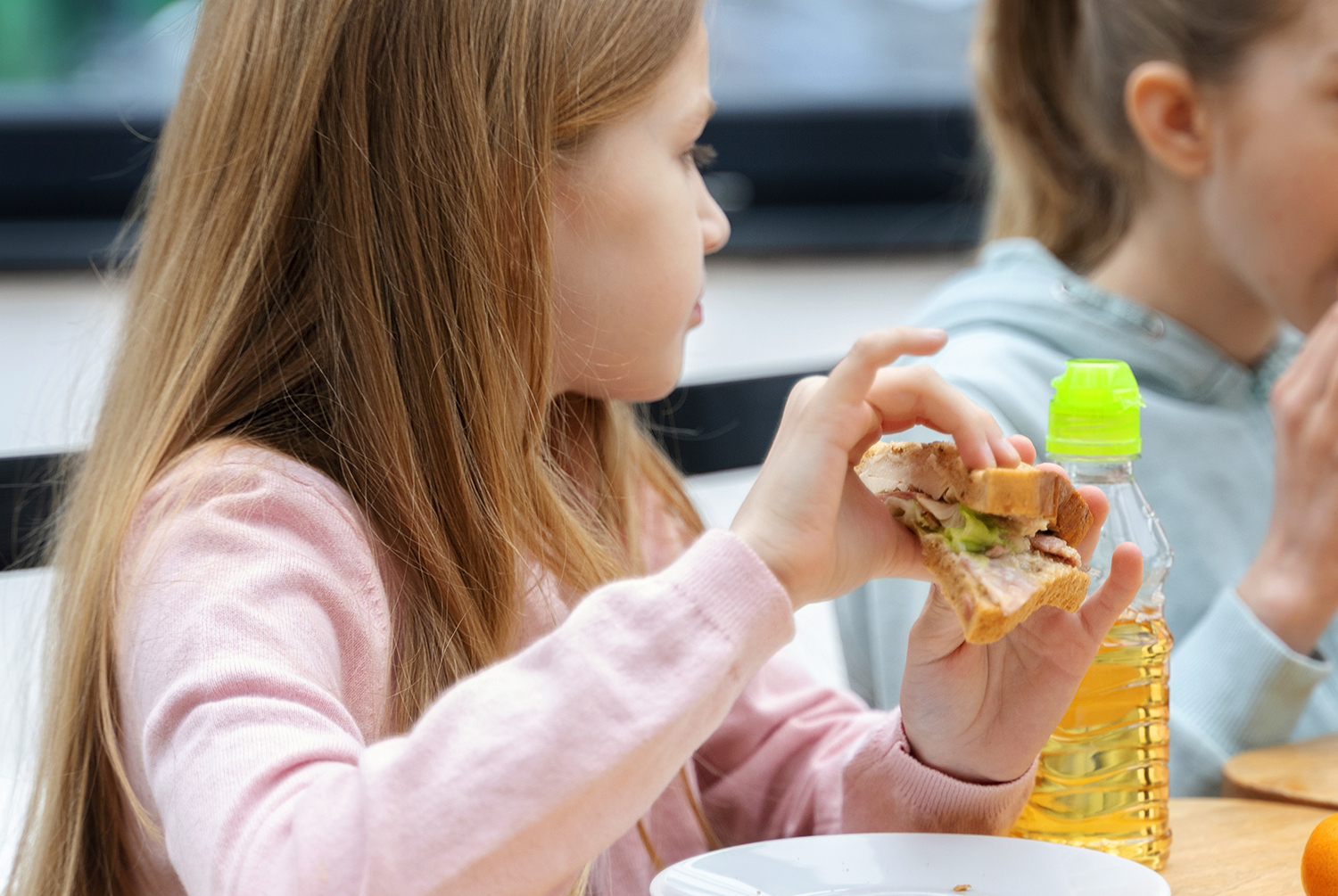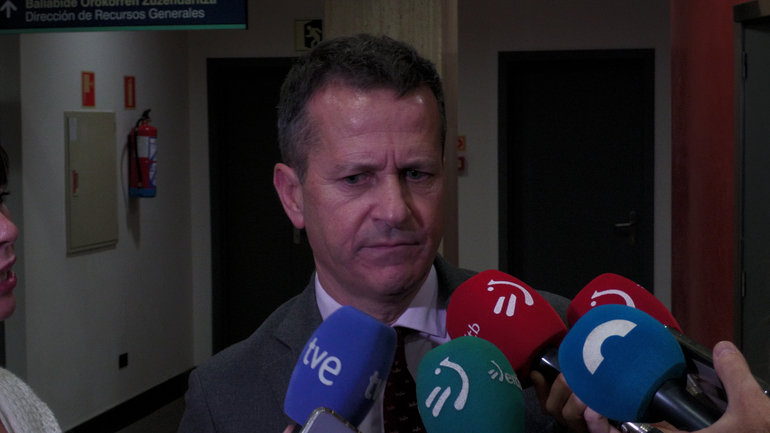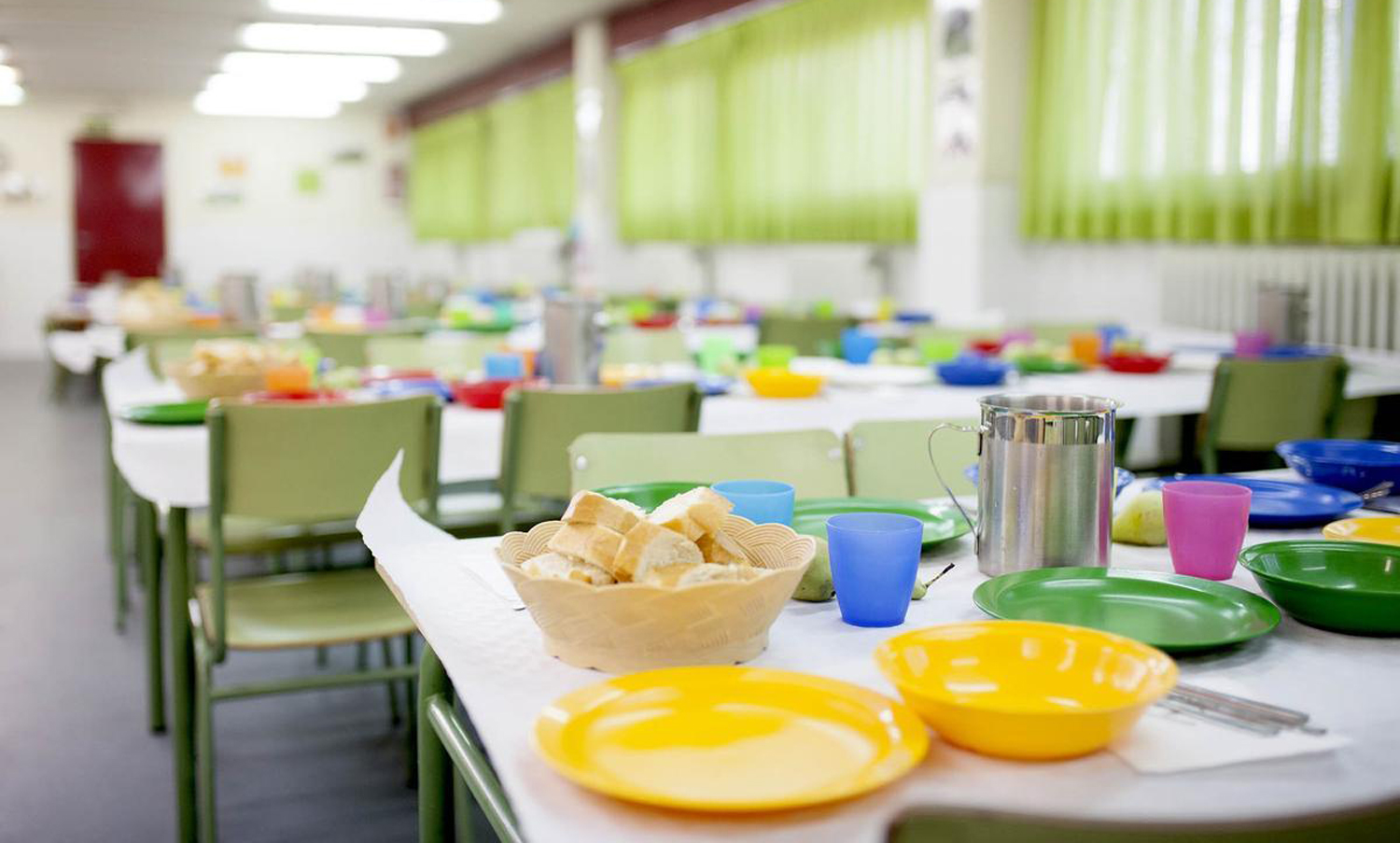Altzaga, one of the few who resisted aggression to the removal of kitchens
- Two are the only public centers of the CAV that maintain their kitchen, managed by associations of fathers and mothers: Larrabetzu met her in 2010 at ARGIA (number 2.225), which purchases raw materials from local producers. The advantages of the small. On this occasion we will meet the other, the Altzaga College of Erandio, and in this large dining room (they eat about 540 pupils a day), we will see how food and management sovereignty clashes with the industrial catering model promoted by the Basque Government. In Euskal Herria there are more models that manage the school dining room on the premises, with products from local producers, many in the local kitchen and no more expensive.

Zuriñe Miguel and Kontxi Akesolo, a member of the AMPA and responsible for the dining room, have told us that the Ikastola Altzaga de Erandio, a co-operative of parents at its origin, has turned 48 years old and that they have started the organization to celebrate the half century above. Although Spanish will speak more fluently, they have decided that the interview should take place in Basque. They are proud to have kept their kitchen during these 48 years: “Many things have changed, the ikastola started on a floor, being the parents partners of the cooperative, and it has been growing, it was published… but the kitchen has always been, that has not changed. It's because we value it."
Five years ago, it was considered necessary to open a third line – with three classrooms at each level of study – to meet the enrollment request. The smaller ones couldn't fit in the main building and started building the new building. As they have explained with bitterness, “the Basque Government did not give us permission to put the kitchen there. We are totally against that dining model that we have produced outside of us industrial catering, but we have had no choice but to say: The Government ' s response was that if in the new building we did not accept the system change, instead of opening a line on our own, they would create another centre in the people. In two days, they gave us a deadline to respond. We only had one day to meet and agree between the fathers and mothers.” Since then, the school has two systems: the largest is managed by the parents, the smallest by the Basque Government.
Catering in both, but different management
It is curious and we have to understand the way in which the administration designates the management of canteens. It says “direct management” to what is furthest from the center, that is, to the direct management of the administrations. And it calls “indirect management” the management of the dining room in the center itself.
In Altzaga there are two forms of management: the dining room managed by the administration gives daily meals to about 110 students under 5 years of age. And managed by parents to 540 students between the ages of 5 and 16. Regarding the difference, Miguel and Akesolo answered: “The quality of catering managed by the Basque Government is not going to be bad, but parents do not know. We choose which food to buy and from where. There, food is prepared and we control more: if kids don't like food, it changes. The parents are in charge of the dining room and from time to time we come to see how it goes from the beginning of the service to the end, we eat there to taste the food, we talk to the workers...”.
And please note, the management of this large dining room with local kitchen is carried out by the AMPA through a catering company (unlike the Larrabetzu school): “Through it we hire 35 workers (both cooks and monitors). The decision is ours, we will always have the opportunity to decide not to have catering. We’ve thought about it, but for the moment we haven’t taken any steps.”
The cost of management in the hands of parents is very high: on the one hand, the Basque Government leaves students without the help of the dining room; students who come from another country, in addition to transport aid, should also be for the dining room, as they have no choice but to make food in the centre. “There are many students here in this situation, but they don’t get any help.” On the other hand, “all the service is paid by the parents, the government does not put any money”.
HACCP or how to force citizens into industrial food
HACCP (Hazard Analysis and Critical Control Points) is a standard process used in the food industry. It predicts the risks at each stage of the process and introduces self-control plans. In the CAPV, the dining rooms should have more than 300 diners. According to parents, this means following a rigid work process and having to write everything: “We have to write down all the recipes used, the cleaning of all the places and utensils, all the work actions and we always have to follow the same steps, and check that this is done... we have to write every day, for example, the meat has come: what temperature has, what time we have stored it, where... From time to time, inspectors come to do audits.” They serve to ensure safety, but in the local kitchen such as Altzaga they prevent the preparation of their own raw materials: “For example, the lorry that brings meat must have a refrigerator according to AKKPA and the butchery of the village does not have it. Nor can we buy vegetables from the fields around because they don’t have permission to sell.”
And yet, the Altzaga system is much cheaper.
The share of the adult dining room in Altzaga, with its own kitchen, is 74 euros per month, covering the entire service they have subcontracted through the catering. The Basque Government does not provide a euro. The share of the small dining room in Altzaga, which prepares industrial catering outside the centre, is 91 euros per month, with which 73% of the service is paid and the remaining 27% is taken over by the Basque Government. “We also work for catering, it’s more expensive than hiring workers directly, but it’s much cheaper. And to that excessive share of parents adds government money! It is a disgrace. It seems that there was a time when they wanted the dining area to be handed over to the companies. While catering services are intended for caterings, they can be smaller and as close as possible to the center. So the food will come out better. But they do it the other way round, when every four years the specifications or conditions for the award of catering are ratified, what they always ask is for companies to be larger. We don’t understand.”
DISTRIBUTION OF SCHOOL MENUS IN CAPV (2011-2012)

Ikasturtero 90 milioi euro inguru mugitzen ditu EAEko ikastetxe publikoetako jantokien zerbitzu osoak (menua, prestatzea, zantzaileak...). Horren %73 familiek jartzen dute eta gainontzekoa Hezkuntza Sailak.
EAEko 500 ikastetxe publikotan 93.500 ikaslek bazkaldu zuten egunero jantokian 2014-2015 ikasturtean. Euskal Herriko 108 ikastoletan gutxi gora behera ikasleen erdiak bazkaltzen du jantokietan: 27.000 ikasle inguruk.
Ikastola bakoitzeko jantokia ikastolak berak kudeatzen du. Hego Euskal Herrian 74 ikastola daude Ikastolen Elkartean, eta horietatik 36tan bazkaria bertako sukaldean prestatzen dute. Bertako langile eta begiraleak ikastolako langile dira. Elikagaiak, aldiz, kanpoko enpresen bidez erosten dituzte. Kudeaketa eurengan egonik, bertako eta garaiko produktuak erabiltzea ikastola bakoitzaren esku dago.
Zerbitzuaren kostua osoki ikastolak hartzen du bere gain (Eusko Jaurlaritzak ez du inongo ekarpenik egiten) eta bertako ikasleek aukera dute Jaurlaritzak ematen dituen jantokiko bekak eskuratzeko.
Hauek dira bazkaria bertako sukaldean prestatzen duten ikastolak: 1. Abusu (Bilbo) 2. Seber Altube (Gernika) 3. Txantxiku (Oñati) 4. Zurriola (Donostia) 5. Assa (Lapuebla de Labarka) 6. Udarregi (Usurbil) 7. RM Azkue (Lekeitio) 8. Orereta (Errenteria) 9. Pasaia-Lezo Lizeoa (Pasaia-Lezo) 10. Betiko (Leioa) 11. Jaso (Iruñea) 12. San Fermin (Zizur Txikia) 13. Paz de Ziganda (Atarrabia) 14. Aresketa (Amurrio) 15. Ander Deuna (Sopela) 16. Laskorain (Tolosa) 17. Kurutziaga (Durango) 18. Jakintza (Ordizia) 19. Andramendi (Beasain) 20. Uzturpe (Ibarra) 21. Urretxu-Zumarraga 22. Salbatore Mitxelena (Zarautz) 23. Tantirumairu (Lesaka) 24. Santo Tomas (Donostia) 25. San Benito (Lazkao) 26. Armentia (Gasteiz) 27. Laudio 28. Arangoiti (Irunberri) 29. Argia (Tutera) 30. Kirikiño (Bilbo) 31. Urretxindorra (Bilbo) 32. Larramendi (Mungia) 33. Asti Leku (Portugalete) 34. Andramari (Zornotza) 35. Aranzadi (Bergara) 36. Eleizalde (Bermeo).
Jantokirako propio lekurik ez dagoen ikastetxe publikoetan, Eusko Jaurlaritzak baimentzen du zerbitzua herriko ostatuetan ematea. Hau gaur egun praktikan, eskola txikietan ematen da. Hezkuntza Sailak egiten dituen eraikin berri guztiek izaten dute sukalderik gabeko jantokia. Baina eraikin zaharra edo udalak eskolarako utzitako egoitza duten ikasleek abantaila hori badute, egunero bertan prestatutako ostatuan jatea. Gurasoek aukera behintzat badute sukaldariarekin zuzenean oinarriez hitz egiteko (menuak, zer eta nondik erosi...). Jantoki hauetako gurasoen kuotak eta Jaurlaritzaren diru-laguntzak gainerako ikastetxeetako catering industrialen berberak izaten dira. Gipuzkoako Eskola Txiki hauetako ikasleek bazkaltzen dute egunero herriko ostatuan: Abaltzisketa, Gabiria, Larraul, Alkiza, Zerain, Olaberria eta Aduna.
Nafarroan eskolako jantokiak bertako guraso elkarteek kudeatzen dituzte. Gehienek catering enpresen bidez kontratatzen dute zerbitzua, baina badira zuzenean eramaten dutenak ere. Eskola batzuek bere sukaldea dute eta bertan prestatzen dute bazkaria, eta beste batzuek kanpotik ekartzen dute.
Landa eremuko eskoletan, berriz, etxetik prestatutako janaria eramaten dute: herri txikietako 70 eskolatik goiti daude, eta jantoki sistema ekonomikoki eutsi ezin dutenez, ikasleak bazkaria ontzian joaten dira. Guraso elkarteak begiralea jartzen du, ikasleak zaintzeko. Eskola hauen aldarrikapena da babes legal bat sortzea, Espainiako Estatuko hainbat lekutan legeak baimentzen baitu ontzietan etxetik janaria eramatea.
Nafarroako Gobernuak laguntzak ematen dizkie eskolara bere herritik kanpo doazen ikasleei, eta kuota guraso elkarte bakoitzak finkatzen du.
Zuberoa, Lapurdi eta Baxenabarren herriko etxeen eskumena da kantina zerbitzua ematea. Herriko 3-11 urte bitarteko haurrak elkartzen dira hauetan, ikastetxeak bat baino gehiago izanik ere. Frantziako Estatuaren arauak ere oso estuak dira, sukaldea bertan izatea galerazten dutenak. Herriko etxe bakoitzak bere irizpideen arabera erabakitzen du zein catering enpresa kontratatu. Ikasle bakoitzaren kuota, gurasoen diru sarreren araberakoak izaten dira.
Uxue Arbe ARGIAko harpidedunak lagundu digu erreportajerako dokumentatzen. Unibertsitaterako aurten egin duen lanean (Eskola jantokiak: Elikadura arloko alternatibak zurkaizteko aukera) bildu du EAEko jantokien bilakaera:
- 80ko hamarkadan hasi eta 90eko hamarkadan ezinbesteko bihurtu zen zerbitzua. Emakumeak ordaindutako lan merkatura sartzearen eta gizonak ordaindu gabeko lan erreproduktiboetara ez sartzearen ondorioz, eguerditan etxean egoteko zailtasunek eragindakoa da jantokien beharra.
- 80ko hamarkadan kudeaketa modu anitzak zeuden, nagusiki bitan multzokatu daitezkeenak: guraso elkarteen ardurapekoak eta Hezkuntza Sailaren ardurapekoak.
Lehenengo kasuan, guraso boluntarioek ardura handia zuten kontratazioak (sukaldeko pertsonal funtzionariorik ez bazegoen), erosketak edota menuak erabakitzeko. Hartutako erabaki horien finantziazioa neurri batean publikoa zen, hau da, aurrekontu publiko bat elkarte pribatu batek kudeatzen zuen, tarteko esleipen publikorik gabe. Gainera, gatazkak sortzen zirenean, nahasi gertatzen zen argitzea nori zegokion erantzukizuna, eta gainkosturik bazen, bere egitea. Bigarren kasuan, Hezkuntza Sailak pertsonal funtzionarioaren bidez edo catering enpresen kontratazioaren bidez eskaintzen zuen zerbitzua.
- 2000. urtean Jaurlaritzak araudia berritu eta legez, gurasoen kudeaketa eten zuen. Zerbitzua hornitzeko, homologatutako enpresak soilik aurkeztu zitezkeen, eta bi zerbitzu mota eskaini behar zituzten: cateringa (janaria sukalde zentraletan prestatzea), eta cateringa in situ (enpresek hornitutako lehengaiak erabilita, eskoletako sukaldeetan prestatzea). Hezkuntza Sailak aurretik hartutako beste erabaki bat izan zen sukaldeak ez berritzea eta eskola berrietan sukalderik ez egitea.
- Legeak lege, 2007-2008 ikasturtean 8 eskolek eusten zioten gurasoen kudeaketari. Presioa handitzeko beste neurri bat iragarri zuen Hezkuntza Sailak 2008ko maiatzean: kudeaketa Jaurlaritzarengan utzi ezean, ume bakoitzeko jasotzen zen diru-laguntza publiko oro kenduko zieten. Egun, bost ikastetxetako jantokien kudeaketa dago guraso elkarteen esku: Larrabetzu, Altzaga, Deustu, Aranzabela eta Mendebaldea. Azken hiruek ez dute sukalderik ikastetxean.
- 2009an, Nekazaritza Sailak ikerketa bat eskatu zuen elikagai ekologikoetan oinarritutako proiektu pilotu baten bideragarritasuna aztertzeko. Ikerlanaren emaitzak ikusita, eskoletan bertako elikagai ekologikoen horniketa ez zela aproposa ondorioztatu zuen.
- 2014ko ekainean, legez besteko proposamena aurrera atera zen Eusko Legebiltzarrean. Honen arabera, lau eskoletako guraso elkarteen esku gelditu da proiektu pilotuak garatzeko ardura. Prozesuak martxan dira eta lehen eskolak 2016ko urte hasieran jarriko du praktikan gurasoen kudeaketa.
























